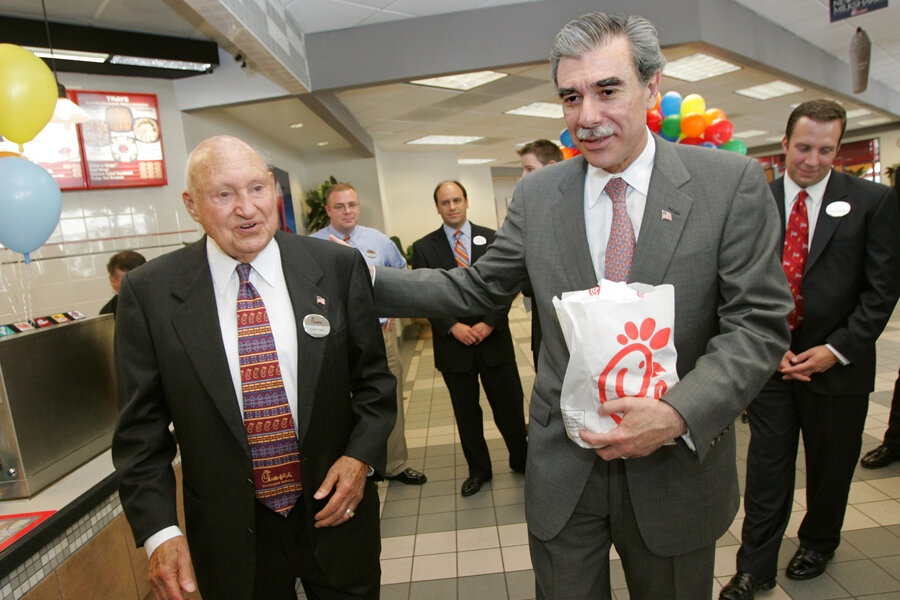Chick-fil-A founder S. Truett Cathy remembered for fast-food success, gay marriage stance
Loading...
| Atlanta
S. Truett Cathy, the billionaire founder of the privately held Chick-fil-A restaurant chain that famously closes on Sundays but also drew unwanted attention on gay marriage in recent years because of his family's conservative views, died early Monday, a company spokesman said. He was 93.
Chick-fil-A spokesman Mark Baldwin told The Associated Press that Cathy died at home surrounded by members of his family. The company said in a statement that preliminary plans are for a public funeral service at 2 p.m. Wednesday at First Baptist Jonesboro in Jonesboro, Georgia.
Cathy opened his first postwar diner in an Atlanta suburb in 1946 and by 1967 he had founded and opened his first Chick-fil-A Inc. restaurant in Atlanta. Over ensuing decades, the chain's boneless chicken sandwich he is credited with inventing would propel Chick-fil-A expansion to more than 1,800 outlets in 39 states and the nation's capital. By early 2013, the company says on its website, annual sales topped $5 billion as the chain offered up a taste of the South that went beyond chicken to such offerings as sweet tea, biscuits and gravy.
Under the religiously conservative founder, the chain gained prominence for its Bible Belt observance of Sunday — none of its hundreds of restaurants are open on that day, to allow employees a day of rest. Its executives often said the chain made as much money in six days as its competitors do in seven.
Those religious views helped win Cathy and his family loyal following from conservative customers, but also invited protests when Cathy's son denounced gay marriage.
Cathy's son, Dan, who is currently chairman and president of the chain, had told the Baptist Press in 2012 that the company was "guilty as charged" for backing "the biblical definition of a family." Gay rights groups and others called for boycotts and kiss-ins at Cathy's restaurants. The Jim Henson Co. pulled its Muppet toys from kids' meals, while politicians in Boston and Chicago told the chain it is not welcome there.
The controversy later subsided.
The family-owned company has said it has had 46 consecutive years of positive sales growth. Cathy's $6 billion fortune as the founder of Chick-fil-A puts him on the yearly Forbes magazine list of the wealthiest Americans in the country. The company has listed him on its website as its chairman emeritus after he left day-to-day operations to younger generations.
Truett Cathy began his career in the restaurant business by opening with his brother in 1946 an Atlanta diner called The Dwarf Grill, which was named for the short and stout shape of the restaurant.
He has attributed his hardworking nature — even as a little boy he made money by selling six bottles of Coca-Cola for a quarter — to growing up poor.
"I've experienced poverty and plenty and there's a lesson to be learned when you're brought up in poverty," he said in 2007. "I had to create some good work habits and attitude."
Even well into his 80s, Cathy was actively involved in the chain's operations, including setting up a contract with his children that said they may sell the privately-owned chain in the future but the company must never go public.
"Why would I retire from something I enjoy doing?" Cathy said in a 2007 interview. "I can hardly wait to get here."
An opportunity in 1961 led to the development of the restaurant chain's trademark chicken sandwich when a company that cooked boneless, skinless chicken for airline meals wanted to sell him pieces that were too big for the airline customer's needs. Cathy took those pieces and cooked them in a pressure cooker and served them in buttered buns.
The sandwich was sold at independent restaurants for a few years before he opened his first Chick-fil-A restaurant at an Atlanta shopping mall in 1967.
Cathy also was known for his efforts to help youth. In 1984 he created the WinShape Foundation to help "shape winners" through youth support programs and scholarships. He also created a long-term program for foster children that has foster care homes in Alabama, Georgia, Tennessee and Brazil.
His sympathy for children was demonstrated in August 2008 when he worked out a deal with the parents of two girls who were accused of causing $30,000 in damage to a home he owned in New Smyrna Beach, Florida. The girls were banned from watching TV and playing video games. They also had to write "I will not vandalize other people's property" 1,000 times.
He told the Daytona Beach News-Journal that he didn't want to have them prosecuted and left with a criminal record.
As the author of several books, his 2007 book "How Did You Do It, Truett?" outlined his strategy for success that included setting priorities, being courteous, cautiously expanding a business and not being burdened with debt.
"There's really no secret for success," he said then. "I hope it will open eyes for people. They don't have to follow my recipe but this is what works for me."
Cathy is survived by his wife of 65 years, Jeannette McNeil Cathy; sons Dan T. and Don "Bubba" Cathy; daughter Trudy Cathy White; 19 grandchildren and 18 great-grandchildren, according to a company statement.







